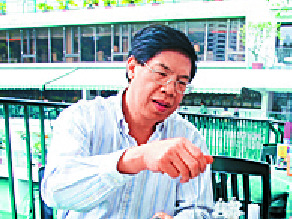Staff reporter
Veteran investor Chan Sun-sun has urged China to use its Exchange Fund to turn some of its US dollar reserves into Hong Kong dollars and invest in shares of Chinese state-owned enterprises listed in the city to boost the stock market.
Chan, who was once the youngest deputy senior executive director on Wall Street and the youngest managing director of the banking industry in Hong Kong, is experienced in foreign exchange and gold trading.
He called on the Chinese authorities to exchange some of its US$3.22 trillion (HK$25.12 trillion) foreign reserves into Hong Kong dollars and invest it in Hong Kong-traded shares of SOEs.
Chan’s suggestion is based on his understanding of recent moves by China’s central bank: the People’s Bank of China has continuously increased gold reserves and decreased US Treasury holdings to reduce the risk of US dollar assets being frozen amid deepening US-Sino tensions.
Chan believes Chinese SOEs are good targets as state-backed funds have kept increasing their stakes in these companies and such moves will attract capital to Hong Kong’s stock market.
Many have called for the HKMA to allocate more capital from the Exchange Fund to stimulate the local stock market. But chief executive Eddie Yue Wai-man repeatedly responded that the city must have enough liquid foreign reserves to maintain the stability of the Hong Kong dollar linked to the greenback.
Chan believes support form the central government could stabilize Hong Kong’s peg regime as well as share prices of state-backed companies.
As a key party meeting kicks off next Monday in Beijing, Chan hopes the central government will seriously consider such a “win-win” measure, as it can prevent some investors from attacking A shares through the selloff of H shares and also safeguard Hong Kong’s role as a financial hub.
Meanwhile, China will suspend securities lending from today, raise the proportion of margins and tighten high-frequency trading, the China Securities Regulatory Commission said yesterday, stepping up measures to maintain stability of the mainland stock market.
The mainland’s CSI 300 Index and Hong Kong’s Hang Seng Index have gone down by over 7 percent and 11 percent respectively from this year’s peak seen on May 20.
www.thestandard.com.hk
